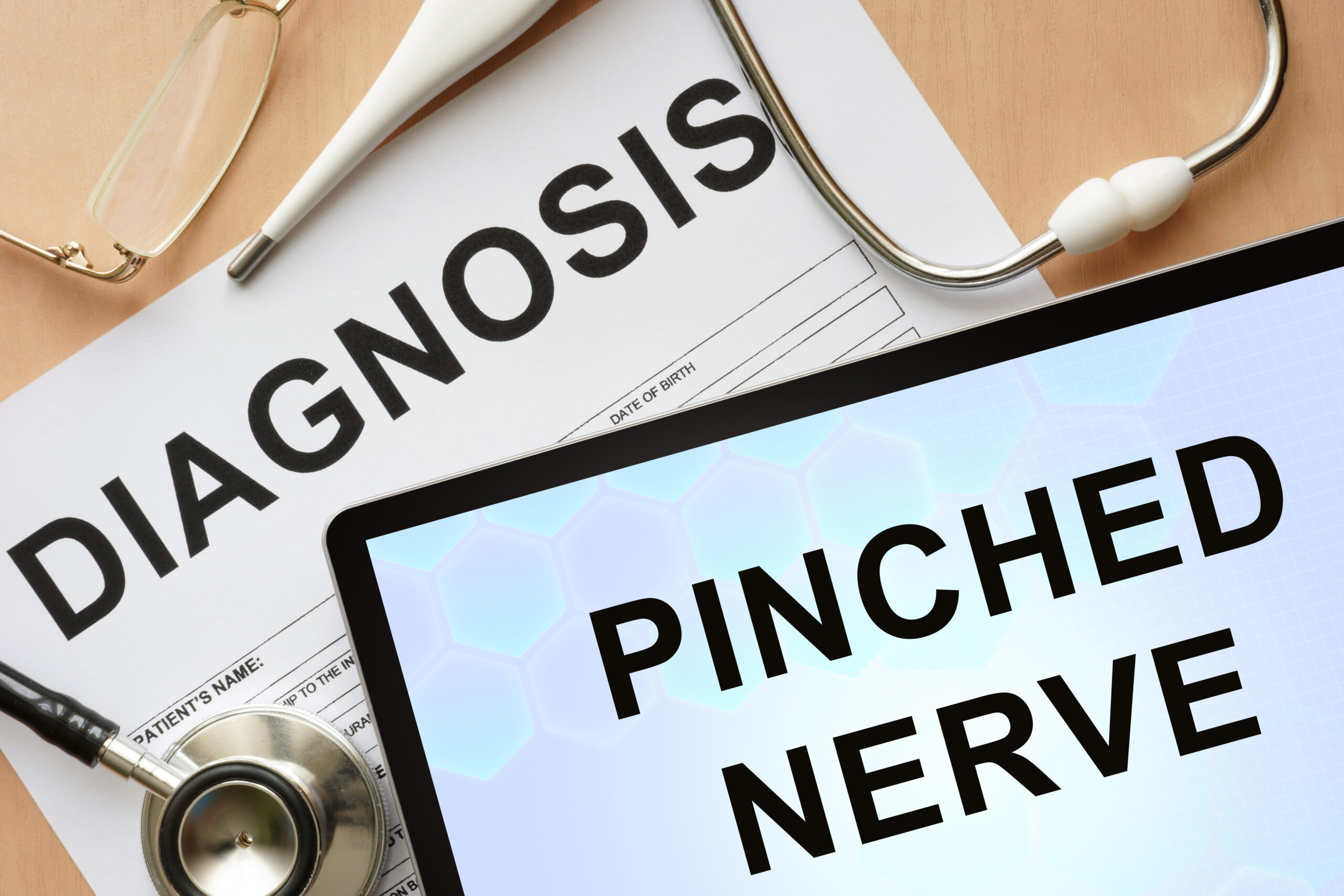Pinched nerves from accidents involving vehicles and occupational injuries are common in the United States. They affect 85 out of 100,000 Americans annually. People over 50 are most at risk for pinched nerves due to age-related spinal degeneration and arthritis, which cause a narrowing of the space in the center of the spinal column.
Pinched nerve injuries can range from mild to severe. More serious outcomes are likely to occur when trauma from a high-velocity motor vehicle crash or fall is involved. The greater the force exerted on the spinal column and surrounding soft tissue, the greater the chance for injury. While most pinched nerves resolve on their own, they can lead to chronic pain and permanent disability.
What Is a Pinched Nerve?
The medical term for a pinched nerve is radiculopathy. These injuries occur when the nerve roots that branch off of the spinal cord become squeezed or compressed between bone, cartilage, muscle, or tendons. Accidents that force bones to move out of alignment and put pressure on surrounding tissue are a common cause of pinched nerves. The compression, constriction, and stretching of the spinal column associated with motor vehicle accidents, workplace injuries, and slips and falls are common culprits in pinched nerve injuries.
Sometimes pinched nerves are the result of a herniated disc, which involves damage of the soft cushion between vertebrae. When these discs slip out of place, nerves may become trapped between the bone and surrounding soft tissue, leading to damage or injury to the nerve bundle.
What Are the Risk Factors for Pinched Nerves?
Women are at higher risk for pinched nerves because their skeletal structures tend to be smaller. Age is also a leading risk factor for pinched nerves, as the aging process causes discs to shrink, leading vertebrae to move closer together. Bone spurs that develop due to aging cause a narrowing of the spinal column and can press on nerves, as well. Anyone of any age can suffer from a pinched nerve due to:
- Motor vehicle accidents
- Occupational injuries
- Sports accidents
- Arthritis
- Thyroid disease
- Diabetes
- Stress or overuse injuries
- Obesity
- Pregnancy
- Prolonged bed rest or sedentary lifestyle
What Symptoms Are Associated With Pinched Nerves?
You may experience aching or burning sensations that radiate away from the injured nerves, and your symptoms may worsen while you sleep. Although each patient will experience slightly different symptoms, the following are commonly associated with pinched nerve injuries:
- Pain that originates in the back or neck and shoots down the legs or arms
- A stiff neck
- Pain that worsens when sitting
- Numbness in limbs
- New onset weakness of the limbs
- Pain in the neck, arm, or shoulder regions
- A tingling or pins and needles sensation in the extremities
- Pain that worsens with certain movements
How Will My Doctor Diagnose a Pinched Nerve?
Pinched nerves are diagnosed via physical examination of the patient and with diagnostic imaging tests like x-rays, CT scans, and MRI. Your health care provider may also order a nerve conduction test called electromyography (EMG) to determine if any nerve damage is present. EMG measures the muscle’s response to nerve stimulation using tiny needles inserted into the muscle through the skin.
Diagnosis of a pinched nerve in the back will typically include a description of where the injury originated:
- Cervical radiculopathy: A pinched nerve in the cervical spine can cause pain and stiffness in the neck and shoulders.
- Thoracic radiculopathy: When nerves in the upper middle back are involved, you may experience pain in your upper back and chest.
- Lumbar radiculopathy: Pain in the back, hips, buttocks, and legs may be a sign that nerves in the lumbar spine are involved.
Pain in the arms, elbows, wrists, or hands caused by pressure on the ulnar nerve or carpal tunnel syndrome (CTS) is also common.
What Is the Treatment for a Pinched Nerve?
Treatment for a pinched nerve can range from drug therapy all the way up to surgical intervention depending on the severity of your symptoms. Non-steroidal anti-inflammatory (NSAID) drugs like naproxen, aspirin, and ibuprofen are used to treat pain and inflammation associated with a pinched nerve injury.
For more severe pain, your doctor may prescribe narcotics or muscle relaxers. Caution should be used when taking narcotics since there is a risk a patient could become dependent on them. Other treatment options for pinched nerves include:
- Ice and heat therapy
- Weight loss
- Physical therapy
- Use of a cervical collar or back brace
- Steroid injections
- Surgery
Surgical Interventions for Pinched Nerves
In the most severe cases, you may require surgery to treat a pinched nerve. Types of surgical interventions used to treat pinched nerves include:
- Anterior cervical discectomy and fusion (ACDF): This procedure requires the removal of the disc or bone spurs that are compressing the affected nerves. The vertebrae are then fused together, forming a single, solid bone.
- Artificial disc replacement (ADR): The surgeon removes the injured discs from the spine and replaces them with artificial material, similar to a knee or hip replacement. This procedure allows for more flexibility and movement of the spine than ACDF.
- Posterior cervical laminoforaminotomy: This surgical option involves the surgeon thinning the arching bone of the spinal column in order to access damaged areas of the spine and remove bone spurs and other tissue pressing on the nerves.
Surgery is typically a last resort to treat a pinched nerve after other options have been exhausted. The recovery time for nerve compression surgery can last several months and temporarily prevent the patient from living their regular lifestyle while they heal.
What Are the Long-Term Outcomes for Pinched Nerve Injuries?
Most pinched nerves resolve on their own in four to six weeks with time and rest. In certain cases, the pain may persist for days or weeks, making it difficult for you to perform daily tasks. If you suspect that you are suffering from a pinched nerve, you should seek treatment right away. When a nerve is pinched temporarily, damage is usually reversible. Once the pressure is relieved from the injury site, nerve function is restored. Left untreated, fluid and swelling around the pinched nerve can cause chronic and debilitating pain and result in permanent nerve damage.
Consequently, you should be examined by a medical professional following any traumatic accident or fall, especially those involving blunt force trauma or whiplash, even if you don’t experience symptoms immediately. It can take hours or days for the full extent of some injuries to be known.
Medical expenses for treatment of pinched nerves add up quickly. Some patients are forced to stop working while they recover, resulting in lost wages. If your injuries were caused by another party’s negligence, you may be eligible to receive compensation for your expenses.
Sources:
Mayo Clinic
National Institute of Neurological Disorders and Strokes
National Institute of Neurological Disorders and Strokes- Carpal tunnel Syndrome









